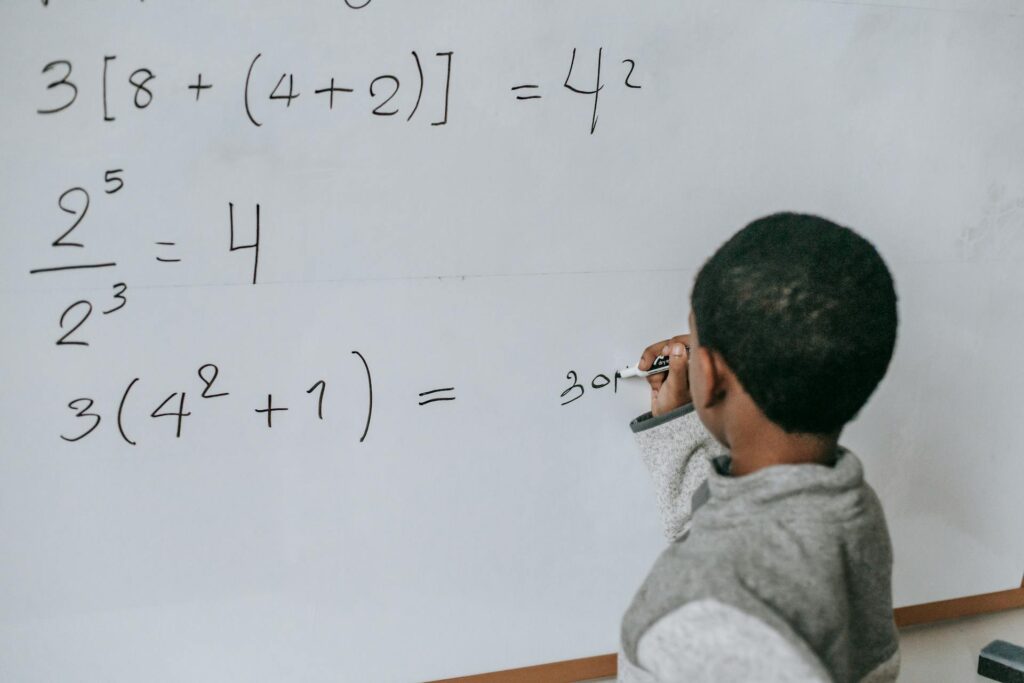Mathematics can be a challenging subject for many children, and supporting them at home can make a significant difference in their confidence and performance. As a parent, you might feel unsure about how best to help, especially if it’s been a while since you tackled topics like algebra or geometry yourself. At Oakwood Tutors, we believe that learning maths doesn’t have to be a solitary or stressful experience. With the right strategies, parents can play a vital role in making maths enjoyable and approachable for their children.
Here are five practical and effective tips from our expert tutors to support your child’s maths learning at home, regardless of their age or skill level.

1. Create a Positive and Supportive Maths Environment
A child’s attitude towards maths often mirrors the attitude they see from adults around them. If a parent openly expresses frustration or anxiety towards maths, a child may begin to associate the subject with negative feelings. Instead, try to foster a positive environment around maths. Even if it’s not your favourite subject, frame it as an exciting challenge or a set of puzzles to solve.
Encourage a “growth mindset” in your child by praising effort rather than just results. If they make mistakes, reinforce the idea that it’s a normal part of learning. Emphasise that everyone can improve in maths with practice and persistence. This approach can reduce their fear of failure and increase their resilience, making them more likely to tackle difficult problems with confidence.
Example: Instead of saying, “I was never good at maths either,” try saying, “Maths can be tricky, but the more you practise, the easier it gets!”
2. Incorporate Maths into Everyday Activities
Maths doesn’t have to be confined to homework and textbooks; there are plenty of opportunities to bring maths into everyday life in a fun and engaging way. Cooking, shopping, and budgeting all involve mathematical concepts that can help reinforce your child’s skills.
Here are a few examples of how you can make maths relevant to daily activities:
- Cooking: Use recipes to introduce fractions and measurements. If a recipe calls for 320 grams of an ingredient, ask your child to figure out how much is needed if you’re doubling or halving the recipe.
- Shopping: Turn a shopping trip into a lesson on budgeting and addition. Give your child a small budget and ask them to keep track of the cost of items in their basket.
- Travel: If you’re planning a trip, ask your child to help calculate the time and distance, which can introduce basic concepts in speed and time management.
These activities show children that maths isn’t just something they need to learn for school – it’s a valuable life skill they’ll use every day.
3. Encourage Regular Practice with Fun Resources
Consistency is key when it comes to mastering maths, but this doesn’t mean your child has to be glued to a workbook. There are many engaging resources available that make maths practice feel more like a game than a chore. Some of our favourites include:
- Math Apps and Games: There are countless apps designed to make maths fun. Apps like Prodigy and Khan Academy Kids offer games and challenges suited to a wide range of ages and skill levels.
- Math Websites: Websites like BBC Bitesize and SplashLearn provide a variety of exercises, video tutorials, and interactive questions.
- Puzzle Books and Board Games: Books of brain teasers, logic puzzles, or board games like Suduko and Monopoly make practising maths enjoyable and collaborative.
Incorporating these resources into regular practice sessions can make a huge difference in how much your child retains. Make it a weekly routine to work on a maths app or puzzle together as a family, turning learning into a bonding experience.
4. Stay Informed and Involved with Their School Maths Curriculum
Staying informed about your child’s curriculum allows you to better understand the specific skills they’re working on and provide more targeted support. Many schools provide online portals where you can see the syllabus, homework assignments, and test dates. If you’re unsure about any aspect of the curriculum, don’t hesitate to reach out to their teacher for clarity.
Attending parent-teacher (or maths tutor) meetings and discussing your child’s progress with their educators can offer valuable insights. These conversations allow you to understand your child’s strengths and areas for improvement and gain useful recommendations for at-home practice. If your child is struggling with a particular topic, you can then focus your support and encourage them to seek help from their teacher or a tutor when needed.
At Oakwood Tutors, we work closely with school curricula, so you can rest assured that our tutors are well-versed in the material your child is covering. If you’re interested in additional support, our GCSE and A-level maths tutoring sessions can be tailored to reinforce what they’re learning in school.
5. Model Problem-Solving Strategies and Patience
One of the most valuable skills you can teach your child is how to approach problems with patience and persistence. When children encounter a difficult maths problem, they may feel inclined to give up or feel overwhelmed. By modelling problem-solving strategies, you can show them that maths challenges can be approached systematically.
Encourage them to break down a problem into smaller, more manageable steps. For example, if they’re struggling with a word problem, guide them to underline key information and think about the question before trying to solve it. If they get stuck, rather than providing the answer, prompt them with questions like:
- “What do you already know about this problem?”
- “What’s the first step you think we could take?”
- “Is there another way to think about it?”
This process of encouraging them to think critically and independently fosters resilience and teaches them to approach problems methodically. Your patience during this process will reassure them that they have the time and support they need to succeed, even with challenging tasks.
Final Thoughts
Helping your child with maths doesn’t require advanced mathematical skills; it’s more about fostering a positive mindset, creating a supportive environment, and being involved in their learning process. By showing enthusiasm, integrating maths into everyday activities, and encouraging regular practice, you’re helping your child develop a foundation for success that will serve them well throughout their academic journey.
If your child could benefit from additional support, Oakwood Tutors is here to help. Our expert maths tutors work one-on-one with students to build confidence, master challenging topics, and make maths a more enjoyable and manageable subject. Whether your child is struggling with the basics or preparing for exams, our tutors are equipped to guide them to success. Contact us today to learn more about our maths tutoring services and how we can support your child’s learning journey.

